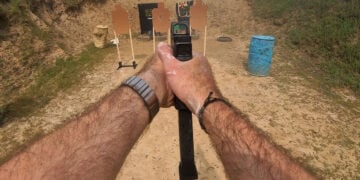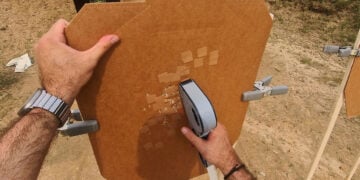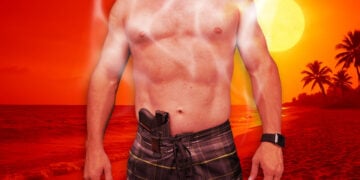I strive to be ever reasonable about “realistic” defensive skills as opposed to the fantasy band camp that we see among many in the shooting and defensive community. While I am all for every citizen being ready to fight I also think they should focus on the skill set that is most applicable to the civilian in a daily capacity. Gear also becomes an issue that seems to fall into the debate of reality versus fantasy. Body armor is one element of gear that I think many people view as not applicable to the civilian at all. I think body armor is a sound investment for all who take self-defense seriously although While I think it has limited use and should probably not be considered a priority over other more critical gear, I believe body armor is a sound investment for all who take self-defense seriously.
General Categories of Body Armor
I am not going to spend a lot of time here discussing the different types of body armor, but if you are not familiar with this, you should educate yourself in this field. To keep it simple for our discussion I will reference the two general categories: soft armor and hard armor. Soft armor is what you will see most cops wearing. It is soft and relatively flexible and is much lighter than hard armor. Soft armor will only stop varying levels of handgun threats and will usually not stop rifle projectiles. Hard body armor consists of actual plates made of ceramic or steel that can stop handgun and the most commonly encountered rifle threats. The downside of hard armor, though, is it is very heavy and because the plates are rigid hard armor they less body area than soft armor.
Ultimately, I think having a set of both is worth-while, and at the time of this writing, you can get excellent quality armor for a fraction of the cost compared to even a few years ago. However, opinions will vary in which should be a single investment, and I think both have their merits and anticipated needs may drive your choice.
Why Should I Consider Body Armor?
Coming back to the discussion of being realistic, why should a civilian consider body armor? I think there are two good reasons for having body armor: First, and perhaps the most practical consideration is in the event of a home invasion. If you need to respond to a bump in the night that turns out to be a dangerous situation having body armor provides another layer of protection not only for yourself but for the family you must defend because your ability to keep fighting equals their ability to survive. If you select the appropriate body armor and stage it correctly, you can put it on very quickly. Home invasions happen fast, so upon waking to such a situation your priority should be arming specific, but correctly staged armor can be thrown on very rapidly if there are an extra few seconds.
The second reason for having body armor would be in the event of unusual or extenuating circumstances. While I am not a subscriber to the post-apocalyptic survivalist idea, I think any of us could face events in the future where having body armor would be useful. Consider a natural disaster such as another Katrina type hurricane that sees mass civil unrest in a locality. If traveling through such a situation to escape it, body armor would be an excellent option. For such an occasion the soft armor option would probably be best as it is light enough and concealable enough that you can wear it under a jacket or shirt and you would still have protection against the most likely handgun threats.
A Suggested Armor Setup for Home Defense
I think having armor is a sound investment, but like all things, an investment is better if it serves a more immediate purpose than only a less probable purpose. While civil unrest or societal collapse could happen and leave us in a situation where body armor would be useful, the investment may not seem less worthwhile for some if considering only such events. Therefore, if you want to invest in a perfect, I suggest integrating it into your home defense plan.
My preferred body armor option is a set of steel level III plates in a plate carrier that does NOT have a cumber bun. The cumber bun is a mid-section that many plate carriers have that fasten the carrier and provides additional molle webbing for mounting things and also provides room to wear side plates. For active duty military or specialty law enforcement a plate carrier with a cumber bun makes perfect sense, but for my suggested use, I prefer a plate carrier with only quick-attaching side straps. The cumber bun takes too long to fasten if you need to don your armor quickly. I think a set of hard armor plates in a carrier that is fast to put on is a perfect setup for home defense.
With the side straps option, I leave the dominant hand side strap of the plate carrier already fastened, and the support side strap unfastened. In the event of needing to put the plate carrier on quickly, I can do so even while already holding my handgun. I just grab the carrier by the support-side shoulder strap and bring it up over my head, place the gun hand holding the pistol through, and drop the carrier right into place. It takes a few seconds, and I am wearing armor. The plate carrier is so heavy that even without fastening the support side strap the carrier stays on even with pretty vigorous activity. With this setup, you can keep the armor right next to your bed, and in the event of a home invasion, you can be wearing armor within only an extra several seconds. There may not be time to wear it, but if there is it is another layer of preparedness stacked in your favor.
While many people keep their plate carriers decked out with an entire combat loadout of 6 rifle magazines and all sorts of other things, I keep mine to a minimum to save weight and bulk. I keep one rifle magazine, one pistol magazine, and a trauma medical pouch on my carrier. Therefore, in the event of home invasion, I have a spare pistol mag if that is all I have time to access, an additional rifle mag if I do have time to get to my rifle, and, of course, the trauma kit. This sort of setup can be done with soft body armor panels within a carrier if you find that hard armor is too heavy to manage, and it will still offer protection against handgun rounds.
So is Body Armor Worth Having for Home Defense?
In closing, I will say that body armor is, in my opinion, worth having, but there are many things on the gear list that should take priority. If you are new to the world of self-defense, then be sure to get yourself squared away with a good handgun and get trained. After this, I would consider getting set up with a defensive long gun, either a carbine or shotgun and examine the many other facets of home security as well. Alarms, solid doors, etc.., are probably a lot more important than body armor because if you have no warning, your weaponry and armor do you no good. However, if squared away in these other areas, I think a good set of armor, soft or hard, or both, is worth considering.









